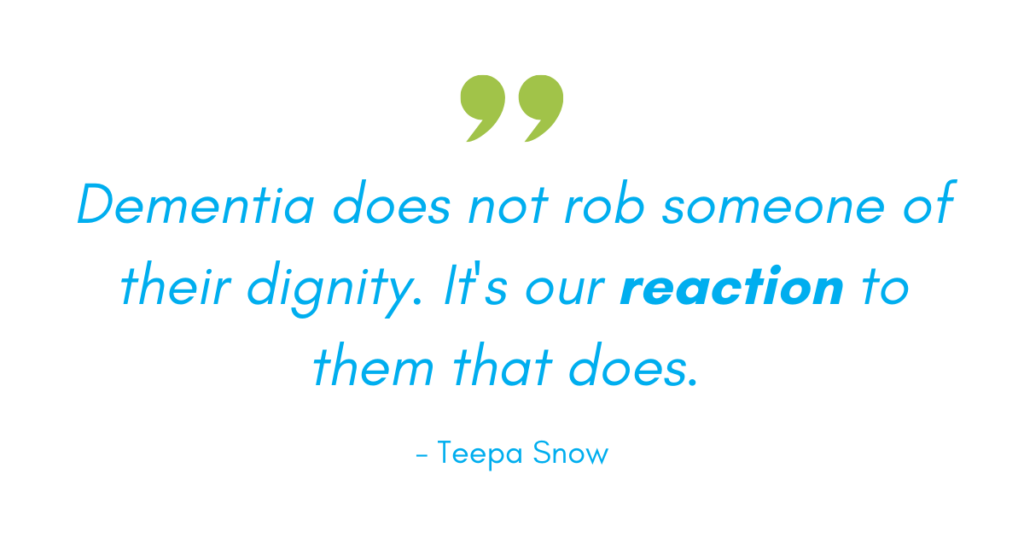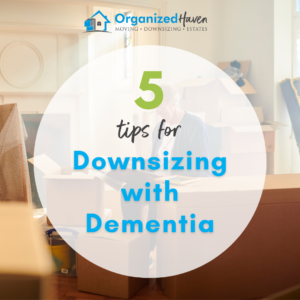There is no doubt that downsizing for seniors in general is an overwhelming task. Downsizing for a senior who has dementia – this dynamic not only makes the experience more overwhelming, but the experience itself could easily be detrimental to the success of their transition and their mindset, negatively impacting their health and wellness. If you don’t know where to start or your friend, client, or loved one is downsizing and is in the later stages of Alzheimer’s disease or another form of dementia, read on for 5 Tips for Downsizing with Dementia.
MOVING IS DIFFICULT FOR A SENIOR WITH DEMENTIA
Whether it be normal memory loss due to aging or an actual dementia diagnosis, downsizing and moving takes its emotional toll on a senior and their loved ones. The decision to move is not an easy one. Sometimes, the decision isn’t made by the one who is moving, but by a concerned family member or council. Whether by choice or what can feel to the senior, by force, the process of making long-term downsizing plans in a short amount of time can be excruciating – even paralyzing.
GOING THROUGH THE TIME-CONSUMING PACKING AND DOWNSIZING PROCESS
Fortunately, many seniors who downsize do so in stages. From a large home to a small house to an apartment before a senior living community is considered, there is time to let go bits and pieces over a series of moves. For some, however, this never happens until it is absolutely necessary for assisted living options to be considered.
This, by far, is the hardest move – elders who must leave a lifetime of household belongings and move into a small, assisted living apartment. Sacrifices are being made in every area of the home and emotions are running high as patience wears thin.
For a person who has dementia and their family members, emotions run even higher. Emotional outbursts are common as the person with dementia feels robbed of their independence and their dignity as they go through the decluttering process with their loved ones.
Going through the time-consuming packing and purging process with kind and gentle communication and encouragement is crucial to ensuring the downsizing and moving process goes smoothly.
UNDERSTANDING ALZHEIMER’S DISEASE AND OTHER FORMS OF DEMENTIA
Dementia, or how to react to the person with dementia, is still widely misunderstood. Luckily, there are resources to help family caregivers and senior-serving professionals learn more about the condition that is impacting more than 6 million Americans over the age of 65.
An estimated 6.2 million Americans age 65 and older are living with Alzheimer’s dementia in 2021. ~ Alz.org
The best way to react when a loved one with dementia begins reliving a long-term memory as if it is the current time, is not commonly known. Saying things like, “Don’t you remember, mom, that you live in Florida now? Or “You moved from New York 20 years ago!”” is a reaction that robs someone of their dignity.
Teepa Snow, the world’s most well-known dementia care expert, developed the Positive Approach to Care®, which provides training, services, and products around the world. It is a program the provides guidance in working with people living with neurodegenerative change. TeepaSnow.com and https://www.youtube.com/c/teepasnowvideos are excellent resources to help you have success with a positive approach.
1. BUILD TRUST
In order to get things moving, you’ll need to build trust with mom/dad or the senior who is making this move. Being understanding about the items they have saved and not being judgmental about the items they want to keep are key. An honest conversation is okay, but if you don’t seem supportive of them during this process, the whole thing will come to a screeching halt. Build trust first by being respectful of decisions and allowing more time when the decision on any one item is taking time or proving to be difficult.
2. MEASURE FURNITURE “WISH LIST” AND THE NEW SPACE
Take the time to document the furniture pieces your loved one “wishes” to keep. Independent and assisted living communities usually can provide a floor plan for their apartments. Sometimes these come with quite a bit of detail and will give example layouts with furniture, but sometimes they are blank with very limited detail. Either way, you’ll want to confirm an understanding of the layout and the actual measurements of walls, windows, and areas.
It is also incredibly important to measure the space for items that will go in cupboards, drawers, and closets. Don’t stop with the furniture! There is nothing more stressful than packing too much and being left after the move with a number of boxed filled with contents that won’t work in the space.
A senior with dementia needs to be able to “see” realistically what will fit – bring them to their new space and draw their measured and intended furniture with blue painter’s tape on the floor in each area. Let him/her communicate what pieces are important and make decisions on what stays and what goes. Use a “this or that” approach when only one will work. Do not make the decisions overly complicated or detailed.
You can learn more about space planning here: https://organizedhaven.com/how-to-get-mom-or-dad-ready-for-their-next-move/
3. SAVE THE SENTIMENTAL ITEMS FOR LAST
Making decisions to keep or let go of items you’ve held dear over a lifetime is incredibly difficult, especially when it comes to sentimental items and mementos. This is a project that simply needs to wait for last. Going down memory lane can be joyful, but it can also lead to feelings of sadness, grief, regret, among others. Conversations erupt and what already is taking quite a bit of time is pushed to another level. Focusing on the basic household goods first will lead to feelings of accomplishment and understanding. Things will progress and when it comes time to make tough decisions to let go of sentimental items like gifts from loved ones you’ve lost, those decisions might be more easily made as there has been lots of practice being realistic about the space and its potential limitations.
There can be so many things that can get in the way of letting things go. You can learn about them here: https://organizedhaven.com/the-barriers-to-letting-go-of-stuff/
4. MAKE SAFETY PARAMOUNT AS DECISIONS ARE BEING MADE ABOUT THE “KEEPERS”
A person with dementia may be more prone to safety hazards in their home. Prevent hazards by following these tips:
- Use appliances that have an automatic shut-off feature
- Have 3-4 lighting fixtures/lamps in each room to ensure areas are well lit
- Remove tripping hazards – say NO to area rugs, extension cords and excessive clutter
- Secure large furniture to the wall to prevent tipping – bookcases especially
- Leave three feet or more of walking space between and around furniture and hallways
A more inclusive list of home safety tips can be found here:
https://www.alz.org/help-support/caregiving/safety/home-safety
5. HIRE A PROFESSIONAL WITH EXPERIENCE
Packing and purging is something you want to begin early enough to avoid a rushed experience, especially for the benefit of the person who is downsizing with dementia. Know that there are experts that can make this overwhelming journey more enjoyable and less stressful, whether you have 3 months, 3 weeks, or even less!
Senior Move Managers® are trained members of the National Association of Senior & Specialty Move Managers. You can find professional help near you by going to their website @ www.NASMM.org.
Some Professional Organizers also specialize in helping seniors downsize and move. Find a member of the National Association of Productivity and Organizing Professionals near you by going to their website @ www.NAPO.net.
Organized Haven is a NASMM A+ Accredited moving, downsizing, and estate clearing company. We have a team of Professional Organizers, Senior Move Managers® and Movers who help seniors and their families downsize a lifetime whether they are moving or aging-in-place. We are trained in helping those with memory and cognitive decline and understand communication matters.
Fellow organizers or senior move managers®, what are some of your tips and resources for helping someone with dementia downsize? Let my readers know in the comments!
PIN IT to remember it!
Don’t go it alone!
💙,
Nicole
By: Nicole Ramer, SMM~C
(Professional Organizer & Certified Senior Move Manager®)





0 Comments